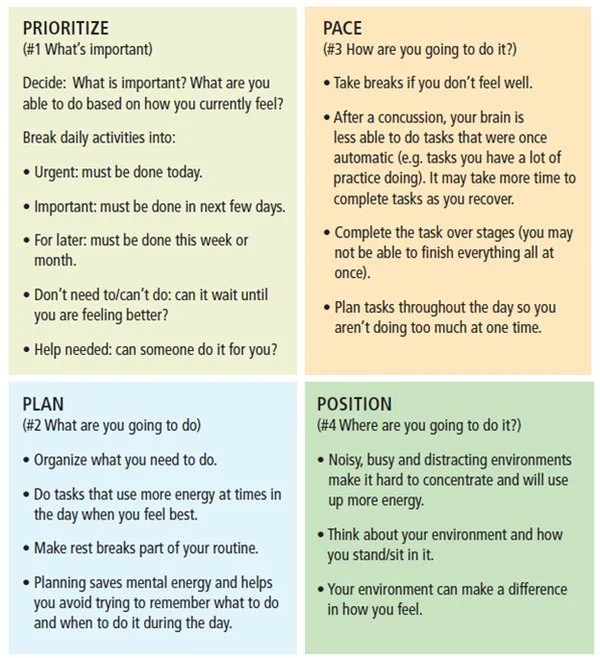
Larchwod Blog
Occupational Therapy & Concussion Management
Following a concussion, an individual may be referred to or seek help from multiple health professionals– one of which is an occupational therapist. But what is occupational therapy and how can it help with concussion management?
Occupational therapy is a regulated and licensed health profession which aims to enable participation and engagement in everyday meaningful activities. Within occupational therapy, “occupation” is loosely divided into self-care, productivity, and leisure. Occupational therapists collaborate with their clients in looking at the strengths and limitations in each of these occupational realms in order to find ways to help their clients do what they want to do, need to do, or are expected to do in their daily lives. Occupational therapists provide a unique viewpoint of assessment, treatment, and recovery as they work in a broad scope of practice areas and can understand rehabilitation holistically and functionally.
Here are 5 ways that occupational therapists can help with concussion management:
1. Education. There is SO much information out there regarding concussion care and recovery, and this can be overwhelming for patients. Occupational therapists can help an individual understand their concussion symptoms and how such symptoms may impact their daily life, as well as providing education regarding what treatment options are suitable and available for an individual’s unique context.
2. Re-engaging in meaningful activities. It is natural for concussion patients to feel disoriented from their daily routine as they learn to manage their post-concussive symptoms. Occupational therapists can work with clients and their families to determine what occupations are meaningful to the individual and identify ways that the individual can re-engage in these activities through a functional cognitive screening, appropriate education, strategies, and support.
3. Cognitive, visual, or vestibular rehabilitation. Occupational therapists are well equipped to provide cognitive assessment and consequent rehabilitation training in the form of education, cognitive skills training activities, and other functional activities to improve cognitive endurance and tolerance to overstimulating environments. Such cognitive skills training includes functional activities aimed at strengthening executive function and utilizing a strengths-based approach in improving function whenever possible. Depending on an individual’s given impairments following concussion, an occupational therapist can also refer a client to other treatment providers who can further assist with recovery.
The “Four P’s” of energy conservation. Source
4. Energy conservation and relaxation strategies. Over the past several years, concussion care has evolved to no longer prioritize prolonged rest following concussion but rather encourage a gradual return to daily activities. Occupational therapists can provide energy conservation strategies, such as the “Four P’s” principle (Prioritize, Plan, Pace, Position), to promote a gradual return to meaningful activities following concussion. Part of energy conservation is also learning how to incorporate adequate self-care and compassion, and understanding your own limits. Occupational therapists can also work with clients on incorporating mindfulness strategies, coping plans, and other relaxation techniques to manage stress and anxiety related to an individual’s concussion.
5. Return to Work (RTW) Assessments and Planning. We know how challenging RTW can be following a concussion as an individual navigates symptom management in new environments. An occupational therapist can assess readiness to RTW, conduct on-site job demands analyses, conduct ergonomic assessments, and collaborate with your employer on gradual return-to-work (GRTW) planning and monitoring. An occupational therapist can also advocate for any accommodations an individual might require for their job following concussion, including both physical accommodations (e.g., prescribing and recommending assistive technology as needed, modified tasks, etc.) and/or cognitive accommodations (e.g., reduced work hours, increased breaks, coping strategies, etc.). If an individual cannot return to their previous job for whatever reason following a concussion, an occupational therapist can also conduct a vocational assessment to help seek new or alternative opportunities that meet their functional abilities.
These are just 5 of the many ways that occupational therapists can help you with managing your concussion. At Davis Occupational Therapy, we offer private and group occupational therapy services to help you with the above aspects of concussion management and so much more. Contact us today for more information!
Click the button below to see our Concussion and Mild Traumatic Brain (mTBI) Injury Resource list for access to more evidence-based handbooks, webinars, podcasts, and apps for concussion management.






